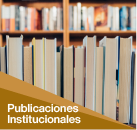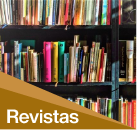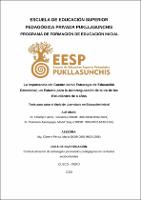Mostrar el registro sencillo del ítem
La Importancia del Cuento como Estrategia de Educación Emocional, un Estudio para la Autorregulación de la Ira de los Estudiantes de 4 años
| dc.contributor.advisor | Climent Pérez, Marta | |
| dc.contributor.author | Champi Hanco, Feliciana | es_PE |
| dc.contributor.author | Palomino Aarosquipa, Marid Dany | es_PE |
| dc.date.accessioned | 2025-06-02T00:20:08Z | |
| dc.date.available | 2025-06-02T00:20:08Z | |
| dc.date.issued | 2024-02-07 | |
| dc.identifier.uri | http://repositorio.pukllasunchis.org/xmlui/handle/PUK/112 | |
| dc.description.abstract | Este trabajo tiene como objetivo fortalecer la autorregulación de la ira en los niños(as) de 4 años de la I.E.I.N.° 985 Hermanos Ayar, ubicada en el asentamiento humano del mismo nombre, en el contexto de pandemia, porque se encontró que los niños(as) presentaban dificultades para regular sus emociones y manifestaban conductas agresivas en la casa como en la escuela. Para ello, se utilizó el enfoque cualitativo, y se entrevistó a las maestras, padres de familia, sabios y maestros interculturales para conocer las diferentes perspectivas sobre el tema. En cuanto las maestras consideran que el desarrollo socioemocional en la infancia es importante, sugieren que se debe trabajar durante la pandemia. Sin embargo, para los sabios la regulación emocional no es tan relevante ya que ellos no ven las emociones como tal, sino como conductas inadecuadas que se debe corregir con castigos y tareas cotidianas. Asimismo, se aplicaron estrategias como el cuento “Tengo un volcán” y soplando una vela, que ayudaron a los niños(as) a expresar y controlar sus emociones de ira. Se concluyó que las estrategias aplicadas fortalecieron la autorregulación de la ira en los niños(as) y que el desarrollo socioemocional es importante durante infancia. | es_PE |
| dc.description.abstract | Abstract This work aims to strengthen the self-regulation of anger in 4-year-old children from I.E.I.N° 985 Hermanos Ayar, located in the human settlement of the same name, in the context of the pandemic. Because it was found that the children had difficulties regulating their emotions and showed aggressive behavior at home and at school. To do this, the qualitative approach was used, and teachers, parents, scholars and intercultural teachers were interviewed to learn about the different perspectives on the topic. As soon as teachers consider that socio-emotional development in childhood is important, they suggest that work should be done during the pandemic. However, for the wise, emotional regulation is not so relevant since they do not see emotions as such, but rather as inappropriate behaviors that must be corrected with punishments and daily tasks. Likewise, strategies were applied such as the story “I have a volcano” and blowing out a candle, which helped the children express and control their emotions of anger. It was concluded that the strategies applied strengthened self-regulation of anger in children and that socio-emotional development is important during childhood. Keywords: Emotions, Emotional Intelligence, Self-regulation, Anger, Didactic Strategies. | es_PE |
| dc.description.abstract | Pisi rimayllapi willsayki Kay yachay atipay llank'aypa qhawariyninqa, yachay wasi IEIN° 585 Hermanos Ayar nisqa sutichasqa , tawa watayuq wawakunaq phiñakuyninku samp'ayachiymi; phiñakuy sunqunku thasnunapaqmi; kay teqsimuyuntin unquypa chawpinpi tarikuspa,warmi qhari wawakunata, wasinkupipas,yachay wasimpipas; taririkurqan phiñasqa, millay auqa sunquyuq, mana usqhayman althapay atiqta. Chay auqapi, phiñanakuypi wawakunaq kausaynin qhawarinapaqmi ruwakurqan imaynachus sapahuqpa kausaynin yuyaynin, chiypaqtaqmi tapurikurqan hamaut'akunata, taytamaku ata, yachayniyuqkunta hinallataq ishkay kinsa kawsaypi yachay atipaqkunata. Imaynachus paykunaqpis qhawariyninku , chay riqsinapaq. Chay ukhupin hamawt'akunaqa ninku wawakunaq sumaq kawsaynin wiñarinampaq llank'rinan allinta kay teqsi muyuntimpi unquypa chawpinpiqa. Chhiynallataq yachayniyuqkunaqa ninku , kay wawakunaq phiñakuynin, chiqnipakuyniqa manan sinchi yuyaychanapaqchu, chiyqa allchakun phiñarikuywan, imay llank'aykunawan aknallan. Hinallataqmi llank'arikurqan t'uhaq urquynisqa willakuykunawan, hinan k'anchayta phukuruspa wawakunata yanapakurqan sunqunkuq t'impuynin, phiñakuynin samp'ayachi apaq. Chaymi yacharikun imay mana llank'aykuna wawakunawan ruwarisqa, kallpancharinmi allinta sap'ayachiyta thak ñichiyta pusillapu phiña, thimpuq sunqunkuta,auqanakuyta, chiqninakuyta. Anchiymi riqsirikun kay wawakunaq kawsayninpiqa kusirikuy, sumaq kawsay chiykunataqa allinta wiñarichina, sullk'allaraq kashaqtinku. Piñakuy , chiqnipakuy chiytataq pisiyachina. Chanin rimaykuna: Kusikuy Llakikuy Phiñakuy, Sumaqpi Allimpi Kusikuy Llakikuy Phiñakuy Apay, Phiñakuy, Llank'anapaq Ya Ha Hinapaq Imaymana Ruway Llank'ay Ashkariy. | es_PE |
| dc.format | application/pdf | es_PE |
| dc.language.iso | spa | es_PE |
| dc.publisher | Asociación Pukllasunchis | es_PE |
| dc.rights | info:eu-repo/semantics/openAccess | es_PE |
| dc.rights.uri | https://creativecommons.org/licenses/by-nc-sa/4.0/ | es_PE |
| dc.subject | Inteligencia Emocional | es_PE |
| dc.subject | Autorregulación | es_PE |
| dc.subject | estrategias didácticas | es_PE |
| dc.title | La Importancia del Cuento como Estrategia de Educación Emocional, un Estudio para la Autorregulación de la Ira de los Estudiantes de 4 años | es_PE |
| dc.type | info:eu-repo/semantics/bachelorThesis | es_PE |
| dc.type.version | info:eu-repo/semantics/publishedVersion | es_PE |
| dc.publisher.country | PE | es_PE |
| dc.subject.ocde | https://purl.org/pe-repo/ocde/ford#5.03.01 | es_PE |
| renati.advisor.orcid | https://orcid.org/0009-0005-9663-2305 | es_PE |
| renati.type | https://purl.org/pe-repo/renati/type#tesis | es_PE |
| renati.level | https://purl.org/pe-repo/renati/nivel#tituloProfesional | es_PE |
| renati.discipline | 111016 | es_PE |
| renati.juror | Eguiluz Duffy, Cecilia María | es_PE |
| renati.juror | Guevara Zambrano, Carlos Andrés | es_PE |
| renati.juror | Mar Salgado, Lourdes Cecilia | es_PE |
| thesis.degree.name | Licenciado en Educación Inicial | es_PE |
| thesis.degree.discipline | Educación Inicial | es_PE |
| thesis.degree.grantor | Escuela de Educación Superior Pedagógica Privada Pukllasunchis | es_PE |
| renati.author.dni | 47676599 | |
| renati.author.dni | 46931878 | |
| renati.advisor.cext | 000955666 |
Ficheros en el ítem
Este ítem aparece en la(s) siguiente(s) colección(ones)
-
Educación Inicial [22]







